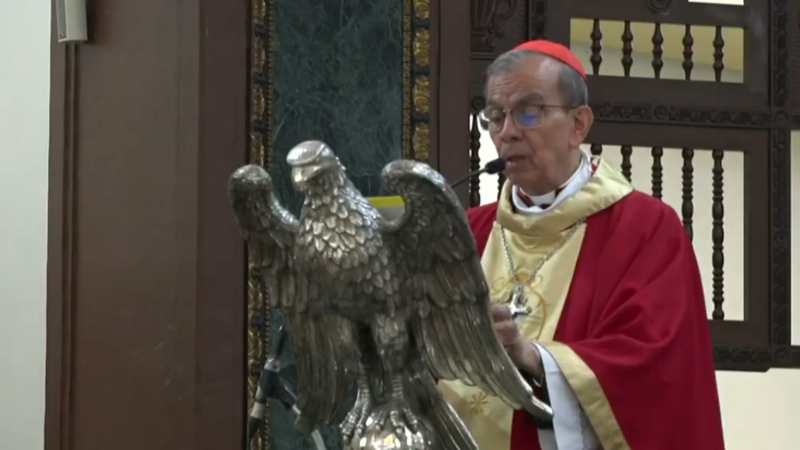A Cardinal echoes Oscar Romero in denouncing abuses of State of Exception
In the 1970's in El Salvador, the government engaged in widespread violations of human rights, with arbitrary detentions, torture and disappearances. Then archbishop, now Saint, Oscar Romero, denounced such atrocities from the pulpit of San Salvador's Metropolitan Cathedral in his weekly sermons. That courage to speak out against the repressive government would result in slander and vilification of Romero by the ruling oligarchic regime, and would ultimately lead to his assassination.
On the 43rd anniversary of Romero's martyrdom this past March 24, another bishop of the Roman Catholic church in El Salvador took to that pulpit to point to abuse of human rights and innocent persons imprisoned. Cardinal Gregorio Rosa Chavez preached on the abuses of the State of Exception and the timidity of the local church, so far, in responding.
Cardinal Gregorio Rosa Chavez addressing “state of exception” here, which has resulted in arbitrary detentions without right to legal counsel, asking where Romero would be..”with the people” he said pic.twitter.com/4z3kRT6ee3
— Rhina Guidos (@rhina_guidos) March 24, 2023
In a question that seemed posed to his fellow bishops, Rosa Chávez wondered aloud during his homily whether they felt as he does: a sense of sadness, frustration, shame, impotence and guilt. However, he said the government had "never responded" to any petitions made by the body of bishops of El Salvador, and like a lot of groups in the country's civil society "we're like a voice crying out in the wilderness."He said the sense of shame came from the feeling that a lot of "our brothers and sisters affected by this political situation must feel as if we've failed them, we haven't lived up to Romero's mandate" to accompany and stand up for the poor.
It is the homily that has brought me the most suffering, both before and after having delivered it in the Cathedral of San Salvador. The central idea was the exhortation of Archbishop Romero: "The pastor must be where the suffering is." The text is a mea culpa that I was doing on behalf of those of us who are called to shepherd a people that suffers so much.Rosa Chavez continued his strong words related to the arbitrary detentions and prison conditions under the State of Exception:
According to Rosa Chavez, since a brief meeting with Bukele upon his election in 2019, there has been no dialogue between the Catholic church and the Salvadoran president. From the allies of the Bukele regime there was an outpouring of vituperation against the Catholic prelate following his March 24 sermon:
Bukele has returned to a strong-arm policy against gangs. This has never worked. How do you see it?
It is the most painful human drama. No person who believes in human dignity can agree to this policy. There is no rehabilitation component in the Government's proposal. The gang member has been demonized in such a way that he is destined to die in jail. The population has suffered so much from the scourge of the gangs that, gripped by fear, they think that if a gang member is released, they will go back to their old ways. Therefore, the choice is to lock him up for life. What John Paul II told us in 1983 is true: "It is mistakenly thought that no one can change."...
What do you think when you see detained men crowded together like animals?
The memory of the concentration camps of the Nazis comes spontaneously to me. The Government itself, with its propaganda, has gloated over these scenes and has shown in great detail what awaits whoever falls into the hands of the Police or soldiers. The presumption of innocence does not seem to enter into the formula of those who deal with the security of the Salvadoran people.
I have said few things like these: the government has been characterized by confrontational language, it is not open to dialogue, it does not promote the unity of the population, and it treats those it considers its adversaries extremely harshly. I knew that the homily on March 24, that complaint, would have a price. And then came the wildest downpour I have received in my 40 years as a bishop. Even people who like me forwarded some of the most offensive and vulgar messages. I remembered a phrase that Monsignor Romero repeated several times: "I am running out of friends."
The words of Rosa Chavez in his March 24 homily and in the Alfa y Omega interview echo strongly of Romero. Here are words of Saint Oscar Romero, who preached from the same pulpit in the Cathedral 45 years ago on September 10, 1978:
I want to support what is good, applaud it, encourage it, console the victims of atrocities, of injustices, and also with courage disclose the atrocities, the tortures, the disappearances of prisoners, the social injustice.
This is not engaging in politics; this is building up the church and carrying out the church’s duty as imposed by the church’s identity.

Comments